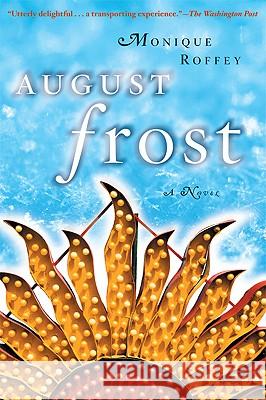August Frost » książka
August Frost
ISBN-13: 9780802140463 / Angielski / Miękka / 2004 / 390 str.
August is a tall, pale, painfully shy young man with blood-orange hair and sun-shy eyes, who hides his awkwardness behind the counter of a gourmet deli in London's diverse Shepherd's Bush neighborhood. One December day, August notices something unusual-a rash on his skin that exactly resembles the frost on his windowpane. The same day, into the peace of the deli and August's dreamy fantasizing about his sassy coworker (with the gender-reversed name of Henry) come a spherical deep-orange cheese which seems to mock August's own coloring, and his mother's old boyfriend Cosmo, whom he hasn't seen since he was a child but who still inspires instant dread. Cosmo fails to recognize him, which is a relief, but it soon becomes clear that he is not going away, even moving in on August's block. His presence becomes a nagging reminder of the childhood August would rather forget-raised in a commune, with an inattentive mother, overaware from a young age of adult sexuality (including his mother's rampant promiscuity), and now, as an adult, realizing that the man he's always been told was his father, who died soon after his birth, was almost certainly not.
August initially writes off the rash as nothing more than that, and his doctor prescribes an ointment that doesn't work. But as other manifestations happen (icicles on his ears, a blue tinge to his skin, snow falling from his head) he cannot ignore what is happening: he is mirroring the weather. At first, it only increases his awkwardness, but gradually he begins to feel better than he ever has. Spring comes and he buds, and leaves sprout in his navel, flowers from his skin. The deli continues humming around him-Henry is learning French for her new boyfriend Yves, a slick Frenchman who August thinks is obviously bad news; local eccentric Cedric, who lives off government assistance and the kindness of the deli, composes ribald poetry (sample title: "Blondes in Tight Pants"); a mysterious East European woman named Flora turns up and takes Cedric under her wing; the deli's motherly owner Rose takes a cruise to the Antarctic and returns with a mysterious South American suitor named Salvadore. August develops an interest in a tall, lovely, accident-prone woman named Leola, who works at the flower shop across the road. And Cosmo, who has befriended Henry, finally realizes who August is, and begins taunting him about his parentage, telling him to ask his mother about "Edward." When he does, she stops speaking to him.
But August's quest has taken on its own momentum. As the summer heats up, he determines to find out the answer to the mystery of himself, tracking down the people who were supposedly his grandparents and learning that Edward was their gardener, and that his mother had an affair with him. In the midst of a cruel heat wave, though his skin is dry and cracked like the earth and his body hot enough to send steam up from the public pool where he swims, August finds himself increasingly comfortable in his body. There is a solar eclipse and, while he had never before been able to tolerate normal sunlight, August does not need sunglasses to look at the eclipse. Though he has not made any moves, Leola clearly likes him (which doesn't prevent a jealous Cosmo from trying to spoil it with taunting remarks about August's background).
As autumn comes, August's hair and fingernails fall out. He goes to Ditchling, where his father lived, and looks for him. He finds only his brother, who tells him that Edward died the previous December, at the time when August's body began to change. Though it is too late to know Edward, August finds comfort in knowing who he was and having some pictures of him. Still, there is something unresolved: an image he's held in his head since childhood, of himself at the window of the commune, watching a tall, elegant man leaving something behind in a copse of trees, and walking away. But August is loath to return to the past. Meanwhile, Rose's ancient pug Hilary has disappeared, and when August finds her locked in a cupboard in the basement, he also finds Rose's passport, which reveals Rose has her own secrets: she used to be a man. August finally goes out with Leola, and their intuitive connection promises to become something important and wonderful. She is also teaching him about plants, overcoming his long inability to make anything grow.
Finally the mysterious Flora convinces August to go to Stonegate-she gives him a pair of "kissing breads" (two rolls whose crust has stuck together as if in an embrace) which, when he tears them open, are full of indigo petals. He realizes there is something else he must uncover. In a rainstorm, he trespasses on the grounds of the old commune, now the country home of a rich family, and digs in the copse for the gift his father left for him, a garden spade. He wonders: "Had Edward forgotten the spade, or had he been embarrassed at such a humble gift? August looked around him, at the leafy yellow-green clllllloud he was in. Light danced around the tips of the leaves, mottled and pretty. There was something about the trees, their solemnity, their great brown trunks, so solid, their quiet, confident permanence, that made him somehow know Edward." The next morning, August wakes up in Shepherd's Bush, his houseplant flourishing and his hair and body returning to normal, and knows he has found the answer to the year's mysteries.











